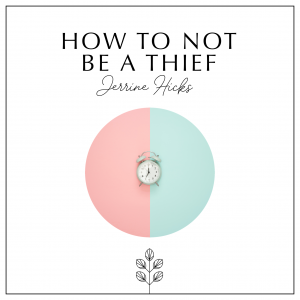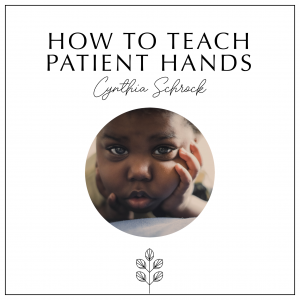The Many Faces of Stealing
posted in: Child Training, Speak Life, Training
0
Question:
My child is only three years old but in a recent conversation with some other moms, the question of children stealing came up. Is there a way I can be proactive in teaching my child that stealing is wrong? Is stealing always associated with someone taking an item that doesn’t belong to him? I really want to lay a foundation of honesty in my child’s heart.
Answer:
I so appreciate your desire to ‘begin as you mean to go’ and to teach the virtue of honesty rather than emphasizing the vice of stealing. I wish there was a short answer to your question, but as I try to provide some positive direction to this issue, you might want to enjoy a cup of tea or coffee while reading this.
Our usual understanding of the 7th Commandment, “Thou shalt not steal,” is in regards to tangible items and that is fairly easy to explain to even a young child of three. However, when we consider that stealing can also involve time or someone’s reputation, then it becomes a more abstract concept. (see blog post “How to Not be a Thief”) We may find it’s easier to keep our thinking associated with an object we literally take from another person or place. We are able to assuage our conscience regarding stealing with, “I’ve never really stolen anything big,” maybe just a pack of gum from the grocery store – which I confess was my sin at age five.
Thankfully, upon discovery of the item, I truthfully admitted I’d taken the gum. My mom immediately took me back to the store, had me return the gum to the owner and confess and seek his forgiveness. Even at that tender age, I knew that stealing, taking something that wasn’t mine and that I didn’t pay for, was wrong. Having to face the store owner was embarrassing for me, so much so that I knew it wasn’t something I wanted to repeat! While I am thankful for that consequence, in hindsight I can’t honestly say there was any realignment that occurred in my heart. My motivation not to steal was to avoid either the embarrassment of returning the item or a negative physical consequence, not the understanding that stealing was a sin against God and dishonored Him as well as our family name and my reputation.
So as parents, how do we bring correction to the action and also work on reaching the heart of our child?
Unlike lying, the sin of stealing is a graded offense. That is, while all stealing is wrong, the offenses may be graded according to the seriousness of the theft. Taking a cookie from the cookie jar without permission carries a different weight of punishment than stealing $100 from Dad’s wallet. The punishment must equal the crime. Even more significant is the context of the theft. Two children may steal items of similar value, but for one the sin may be much greater. There is a difference between the child who steals a cookie from the cookie jar at home and the one who steals a cookie from a bakery. Stealing within the family shames the child; stealing outside the family shames both the child and the family.
In addition, a theft is not always tangible. As stated above and shared in a previous blog, we can steal someone’s time as well as his wallet. But the most perfidious way to rob another human being is to steal his good reputation. Gossip destroys reputations, which can never be completely restored no matter how hard one tries. Unlike smoke, which fades away quickly, gossip and slander leave a long-lasting toxic cloud.
Cheating
Cheating, another form of stealing, is an act of deceiving or defrauding another. I can remember being told that when you cheat, you are only hurting yourself. However, the biblical description of the effects of cheating is not limited to oneself, but includes others and also refers to cheating as an abomination. (see Proverbs 11:1 and 20:10) An abomination refers to something that is repulsive, disgusting, wicked, and foul. Sadly, children learn quickly how to cheat – maybe by doing a chore half-heartedly – and there are often no consequences. Parents should be diligent and watchful for this sinful sprout and have the child return and do the job completely, which would be the logical consequence. Then, without a lecture, help the child understand that this is a form of cheating, lying, and stealing.
This whole topic is one that will warrant discussion and instruction many times over. Start with the little ones when they take a toy from another child. Provide the instruction that their actions were unkind, but also share that when someone takes something that doesn’t belong to him, God calls this stealing. Instruction can deepen as the child matures and can understand the subtleties of these concepts. Without using judgmental words or tone, parents can use third party illustrations or if someone has actually defrauded your child through one of these actions, use that situation as a teaching tool.
As in every area of our parenting, we need to pray for wisdom in how we provide instruction, using words of life to focus on the behavior we desire to see (virtue). We need to be setting the right example for our children by being honest, truthful, and content with what the Lord provides. Usually, the Lord gives us approximately 18 years to be fully invested in the lives of our children. Focusing on developing a trusting relationship with them that grows and matures as they do is one of the best investments you will make in your lifetime. You will be touching the heart of each gift the Lord provides you with for His Kingdom’s sake.
Blessings on your journey…
Anne Marie Ezzo serves with her husband in ministering to families around the world through Growing Families International. For the past 30+ years her passion has been, and continues to be, to encourage wives and moms to practically understand what it means to “love your husband and children”.




